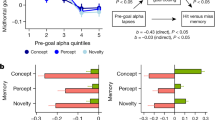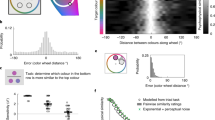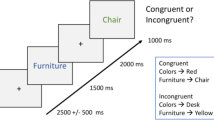Abstract
THE responses made by young normal adults to various methods of dichotic stimulation have been investigated and reported by Broadbent1. His observations have led him to postulate that both perceptual and storage mechanisms are necessary for the correct sequential recall of such simultaneous stimulation.
This is a preview of subscription content, access via your institution
Access options
Subscribe to this journal
Receive 51 print issues and online access
$199.00 per year
only $3.90 per issue
Buy this article
- Purchase on Springer Link
- Instant access to full article PDF
Prices may be subject to local taxes which are calculated during checkout
Similar content being viewed by others
References
Broadbent, D. E., Perception and Communication (London: Pergamon Press, 1958).
Inglis, J., and Caird, W. K., Canad. J. Psychol., 17, 98 (1963).
Mackay, H. A., and Inglis, J., Gerontologia, 8, 193 (1963).
Author information
Authors and Affiliations
Rights and permissions
About this article
Cite this article
INGLIS, J. Influence of Motivation, Perception and Attention on Age-related Changes in Short-term Memory. Nature 204, 103–104 (1964). https://doi.org/10.1038/204103b0
Issue Date:
DOI: https://doi.org/10.1038/204103b0
This article is cited by
-
Effects of Age on the Recall of Dichotic Words
Nature (1965)
-
Memory Changes with Age
Nature (1965)
Comments
By submitting a comment you agree to abide by our Terms and Community Guidelines. If you find something abusive or that does not comply with our terms or guidelines please flag it as inappropriate.



